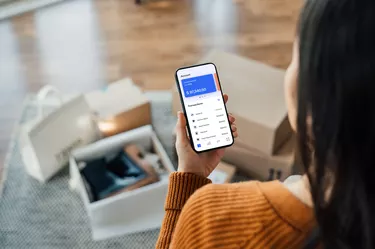
On a day-to-day basis, the only people who typically have access to your different types of bank accounts are you and the bank. In some cases, bank employees can't even access all of your information.
In some cases, others might be able to access some or all of your information, such as law enforcement, your legal representative or credit bureaus.
Video of the Day
Video of the Day
Understanding who gets what information regarding your different types of bank accounts will help you keep your money safe and secure.
Read More: How to Open Secret Bank Accounts
Banks Have Your Information
When you open a bank account, you must provide your bank with your legal name, phone, Social Security number, address, date of birth and other personal information.
In order to manage your paperwork and keep your account and funds up to date and safe, your bank has access to your deposits and withdrawals.
The bank provides you with information regarding each transaction. If you call your bank, the customer service rep might not have access to all of your information, however. For example, if you've lost your password, you'll probably have to reset it yourself – the rep won't be able to see it on her screen. The rep might be able to tell you the last four digits of your Social Security, but might not be able to see the entire number. This helps protects customers' data.
Read More: Who Can Freeze a Bank Account?
Your Legal Assigns
If you have a joint checking account with a significant other, business partner, employees or children, they will have access to your information.
For example, if you have a bank account for a small business and you, a partner or your accounting manager can make deposits and write checks, all of you might see your monthly statements or be able to log in to the account, depending on how you've set it up.
If you have an attorney or have given someone power of attorney, they might be able to access your bank account information.
The Credit Bureaus
The credit reporting agencies don't have direct access to any of your bank account information. They can't tell how much you have in your savings account or your checking account.
If your bank reports to credit reporting agencies, these agencies might be informed if you bounce checks and don't pay the money back in a timely fashion.
The three credit-reporting agencies are Equifax, Experian and Transunion. If you want to see what information they have on you, you can get copies of all three of your credit reports free, once each year, by going to the official website authorized by the federal government, AnnualCreditReport.com. You can access your information more often by setting up an account with a credit-reporting website.
Courts and Law Enforcement
If you are part of a court case, the courts might freeze your account until it's determined whether or not you owe someone money. The IRS might freeze your account if you owe taxes. If the police or other agencies suspect you of illegal activity, they might get a warrant and get access to your information.
Each time you make a deposit of more than $10,000, your bank must file a Currency Transaction Report with the IRS. If you receive more than $10,000, you might need to file a Form 8300 with the IRS. This helps the IRS track potential fraud or criminal activity. If you run a business that regularly makes large deposits or withdrawals, you can apply for a waiver for these reporting obligations.